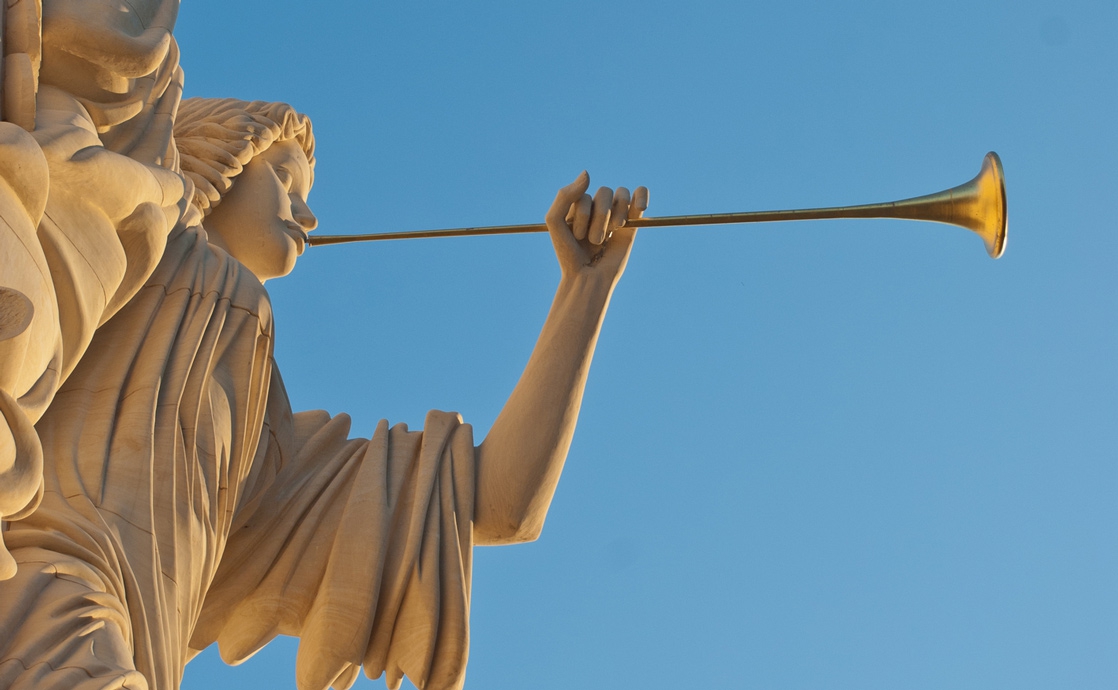The views expressed in our content reflect individual perspectives and do not represent the authoritative views of the Baha'i Faith.
Have you ever seen a play or a film that moved you to tears, that made your heart swell with emotion? The Baha’i teachings praise the powerful role of drama in spirituality, and encourage us all to partake.
So in January of 1913, when he met with the renowned British actress and playwright Gabrielle Enthoven and several others at her home, Abdu’l-Baha asked her: “What is your great interest in life?” and she said “The Drama.”
Abdu’l-Baha replied “I will give you a play. It shall be called “The Drama of the Kingdom.” He then dictated this entire script, speaking without notes and only pausing for simultaneous translation. Initially written down by Mary Blomfield Hall and included in Volume 6 of “The Baha’i World”, Abdu’l-Baha’s play begins by describing the world and its people when the Herald of the Kingdom appears and blows his trumpet.
The Drama of the Kingdom
The Herald of the Kingdom stands before the people. Wonderful music swells from an unseen orchestra, moving and soul-inspiring. The music becomes soft, while the Herald proclaims the coming of the Kingdom. He holds a trumpet to his mouth.
The curtain rises. The stage is crowded with men and women. All are asleep. At the sound of the trumpet they begin to awake.
Suddenly the music breaks forth. The people hear and wonder. They rise and question one another, saying: ’What is this? Whence comes this music?’ Some return to their occupations, unheeding. First a few talk together, then once ceases his work, and proceeds to make enquiries. A merchant, leaving his stall, comes to ask the meaning of the eager group. A soldier, who is practicing arms, withdraws from his comrades and joins those who are wondering.
Here, a banker is seen counting his money; his attention is attracted. He pauses in his calculation, and asks: ’What is the news?’
There are seen dancers and others holding revelry. Some of them come forth and ask the news, questioning the Herald.
Now those who come to ask are more or less divided into the following groups. First those who, having heard of the Coming of the Promised One, frown and shrug their shoulders, returning to their work, scoffing and disbelieving. The second type are those who hear the music, strain their ears to catch the meaning of the Message, and their eyes to discern the Mystery.
The blind receive their sight, the deaf their hearing, and those who were dead arise and walk, still wrapped in the garments of death.
Then there are those who will not believe until they have had signs revealed to them, who crave for proof saying: ’But we want to see the earthquake. If the Promised One is indeed come, the sun should not give his light, the moon should be darkened, and the stars should fall. We await our Promised One till these signs be fulfilled. We expect to see him descend from heaven in clouds of great glory.’
Those who believe shout: ’The Promised One has come!’
Those who doubt cry: ’What proof is there? Show us the proof!’
They who understand explain: ’Whence did Christ come? He came from heaven, though they who scoffed at Him said: “We know this man, he comes from Nazareth.” This is the real meaning: His spirit came from heaven, while His body was born of an earthly mother. As it was then, so is it with the Second Coming’.
’But we await the signs,’ say the doubting ones. ’How, otherwise, shall we know? The earth must shake, the mountains be rent asunder. The Promised One shall conquer the East and the West’
One arises and tells the people that these signs did not come outwardly, nor will they again. Those who look with the eyes of Truth shall see that these portents are of the Spirit.
The Eternal Sovereignty descends from heaven, the body is of the earth. The mountains are men of high renown, whose famous names sink into insignificance, when the dawn of the Manifestation fills the world with light. The pomp of Annas and Caiaphas is outshone by the simple glory of the Christ. The earthquake is the wave of spiritual life, that moves through all living things and makes creation quiver.
The prophecies of the Coming of Christ were mystical. The prophecies concerning the Second Coming are also mystical. The earthquakes and unrest, the darkening of the sun and moon, the falling of the stars – all these foretell the humiliation of those whom the world considers great. Theologians wrapped in blind traditions, the bigots and the hypocrites: such will fall.
Now these sayings will be divided between different people, altogether forming a conversation, questions, answers, exclamations of wonder, and so forth.
Now a procession passes. The Pageant of the World. Grand nobles and kings, high priests and dignitaries of the Churches, jeweled and gorgeously dressed. They look with scorn on those who believe, saying: ’Why should we leave our ancient religions?’ They look like devils of malice and oppression. Yet each is miserable. One falls, the other passes on. One is dying, the others take no heed. Another breathes his last. They do not stop by the way.
The poor who have believed look on sadly.
The scene changes. A banquet hall. The table is spread with all delicious foods. The orchestra is playing heavenly music. The lights become gradually more brilliant, until the whole hall is shining. Round the table sit the very poor in torn garments. An Oracle arises and cries: ’The Kingdom of God is like a feast! Remember what Christ Said! Here we see the Kingdom! The greatest and the worldly wise are not here, but the poor are here!’
Each sings from the joy of his heart, and there is great rejoicing. Some dance, one plays the flute, everyone is radiantly happy. Someone addresses the people. While this man is speaking they say: ’Hear him! Hear his eloquence! We know him. He was poor and ignorant, and now he is wise!’ And so they wonder and question one another. A woman rises and speaks, laughing and happy. The people are surprised, saying: ’But what has happened? Yesterday this woman was sad, and angry. Her heart was full of sorrow and disappointment. Why is she so joyous?’
A man enters with a sack of gold and begins to offer it to the people, but they refuse, one saying: ’I am rich, I do not need your gold.’ ’Nor I.’ ’Nor I.’ The man with the gold is surprised and says: ’We know you are poor and starving. Why do you not accept my gold?’
Then a teacher comes and speaks on a high plane of philosophy and science. All those who listen wonder, for he has been ignorant and accounted of no importance. How is he now so learned?
Another comes with shining eyes, gazing with joy on the beautiful surroundings. The people wonder and say: ’How is this? Yesterday he was blind.’
Another hears beautiful music and he tells the people that a few hours ago he was deaf to all sound.
’A miracle! A miracle! Here is one who was dead, and now is he is walking before us!’
One arises and says: ’You know the cause of these miracles? It is the Heavenly food! Everlasting life is for him who partakes of it.’
When the people hear this they shout with one will: ’Glad tidings! Glad tidings! Glad tidings!’
Each one is supremely happy. They sing an Alleluia.
’O God, we were poor, Thou hast made us rich!
We were hungry, Thou has made us satisfied!
Athirst we were, and Thou has given us the Water of Life!
Our eyes were blinded, Thou hast given us sight!
We were dead, Thou hast given us Life Eternal!
We were of the earth, Thou hast made us the children of Heaven!
We were outcasts, Thou hast made us beloved!
We were helpless, Thou hast made us powerful!
We praise Thee, O Lord!’
After this song, glorious diadems descend from Heaven and rest on each head. They shine with the radiance of Heavenly jewels. All wonder and ask questions. One arises and says: ’These are the crowns of the Kingdom! Ye are all Heavenly rulers! Ye shall have eternal dominion! Ye shall have everlasting glory! The illumination of the spirit is yours. God hath chosen you for His service!’ They take their crowns and kiss them, and again place them on their heads.
Then they begin to pray and supplicate: ’O God! O Almighty! ’We give Thee thanks for these proofs of Thy bounty! Thou hast given us Life! Make us faithful, so that the fire of Thy Love may fill our hearts, that Thy Light may illumine our faces! Suffer us to be firm unto Christ, Who gave up His life for us!’
The curtain falls.
In the last scene one of those who believed is taken by persecutors. ’We mean to kill you,’ they say. ’I am ready. I am happy,’ he answers. With hands raised to Heaven, he cries: ’O God, make me ready!’ Then he gives himself up to death. Another is taken, and dies praising God and His mercy to mankind.
The third is a beautiful girl in a while garment, wearing a heavenly crown upon her head. Everyone gazes at her in wonder. She is seated, apart. A messenger comes from the king with an offer of great riches if she will but give up the Cause which she has embraced. She answers: ’I have not accepted this Cause blindly through tradition. I have seen Reality with mine own eyes. The Truth is in my heart. How should I renounce my faith thus lightly?’
Her father comes and entreats her to give up her faith. She answers: ’Can you say there is no sun, when you have seen the light? I have seen the sun. You are blind. Awake! The sun is shining! Awake!
Another messenger comes. This time from a great prince who wishes to wed her on condition that she gives up her Faith.
’I know no prince save God. I will not close mine eyes to the glory of the King of Kings!’
They bring her jewels and an earthly crown. ’Take these!’ they say.
’These to me are so many pebbles. The jewels I treasure are the jewels of the Knowledge of God. These earthly stones may be broken or lost. Behold my crown! These are eternal gems! For these earthly stones that are doomed to perish, shall I give up this everlasting diadem?’
They say: ’We shall imprison you.’
’I am ready.’
’We shall beat you.’
’I am ready’
’You shall be killed.’
’Is that true? Do you mean it? Good news! Good news! For then I shall be free. My soul will escape like a bird at liberty from this earthly cage of my body. Then shall I be free. Now am I in chains. These bonds shall be broken. Kill me! Kill me!
They slay her. One after another is martyred. Their bodies are covered with shrouds, and after a great silence, people enter and lift the coverings in awe and reverence. They stand wondering, as lights appear and shine upwards from the prostrate forms. Some question as to the meaning of this. ’These are the spirits of those martyred ones, freed from their bodies. Now they enjoy eternal liberty. See, they ascend to the Kingdom!’
Realising this, the people are wonderstruck and amazed. They cry: ’What bounty God has bestowed on them! They are so free and joyful! Now can they wing their way to the Sun of Reality! Their souls return to the Sun from which they came!’
In the next essay, we’ll examine the multitude of beautiful symbols Abdu’l-Baha’s play reveals.
















Comments
Sign in or create an account
Continue with Googleor